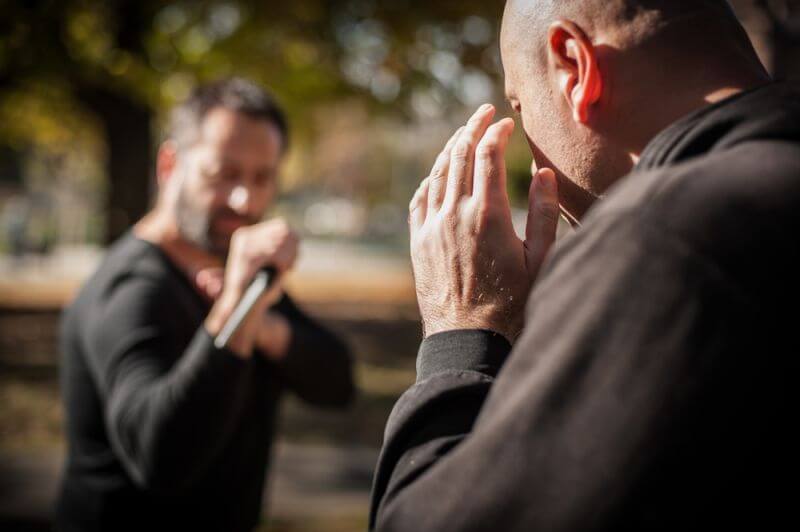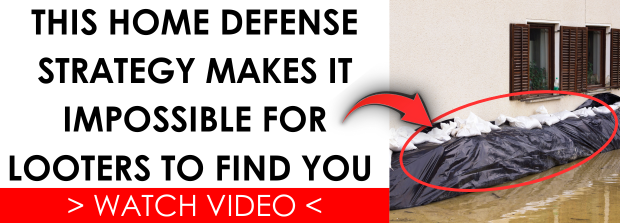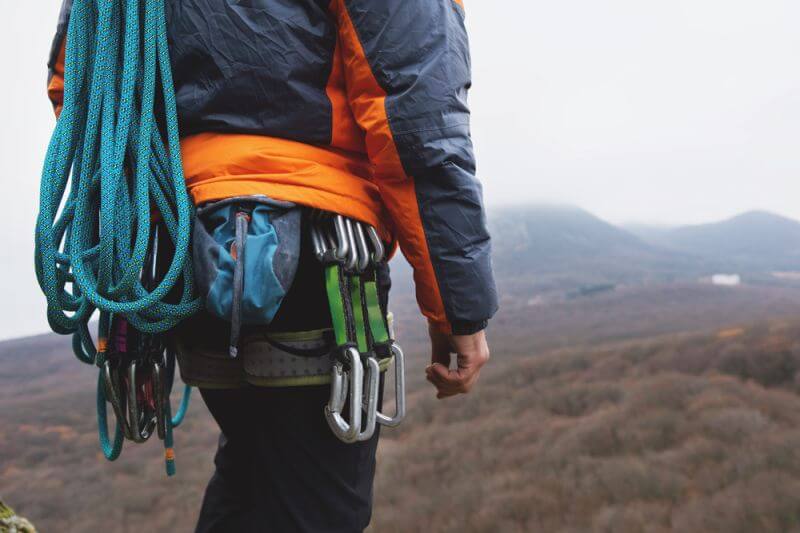One of the many concerns about survival, especially in the wake of a major disaster, is protecting ourselves from others. Desperate people, it is said, do desperate things; and in the wake of a disaster, when there will be shortages of everything we need.
Those shortages, it is widely believed, will cause the average person on the streets and in our neighborhoods to become desperate. As a result of that desperation, they are likely to attack anyone who they think has the supplies that they need. Worse than that, there’s a good chance of them ganging together to make those attacks.
So, what should our response to this be?
Most preppers understand the need to be prepared to defend themselves. We buy guns and ammo, go to the shooting range and make some sort of defensive plans for our homes and survival shelters. The better trained of us go a step further, preparing passive defenses for our homes, to make it harder for attackers to get in. If we have neighbors who are preppers too or who we trust enough to bring in on our prepping plans, we might even create a neighborhood defense plan.
All this is necessary and good. Those are things we should do. Even so, that doesn’t mean that we’re ready. Unless we have true military training and are well-versed in defensive tactics, there are probably holes in our defensive plan. But the biggest hole isn’t usually in our training, it’s in our decision process.
Let’s Look at the Problem
Here’s the problem that I keep seeing, over and over again. Many preppers look ahead to a post-disaster time, making the assumption that there will be a complete breakdown of society, including a breakdown of law and order. In such time, the common assumption will be that we preppers can do just about anything necessary to defend home and family. But can we? Personally, I don’t think so.
It is a point of American law that we can use deadly force in self-defense. While each state’s laws and each state’s courts handle that point of law a little differently, the basic idea is that if someone attacks you, putting you at risk of life and limb, you can kill them, if you deem it necessary, in defense of your own life.
There’s just one big hole in that legal principle. That is, the courts have to agree, after the fact, that it was truly an act of self-defense. In many cases, district attorneys will decide that the evidence is clear and it is self-defense; but in others, it goes to court. Should the courts decide that the criteria for self-defense are not met, then you or I could be declared guilty of manslaughter.
“Okay,” you might be thinking, “that doesn’t really matter in a post-disaster world, as the district attorneys and the courts won’t be functioning.”
Are you sure of that? Can any of us truly be sure of that?
I think that too many of us are getting our ideas about a post-disaster world from Hollywood. In those movies whatever disaster has befallen is so serious that most people die and those who are left are living in isolated enclaves, with no-man’s-land in between them. There is no law they have to report to, so they do what they have to do and let the chips fall where they may. But then, Hollywood is good at ignoring things like the norms of society and the law when those go against their plot line. I mean, how many real people get away with all that killing that some actors do, in the course of one movie?
I’m not saying there is no possibility of things breaking down to the point where there is no semblance of law and order; but short of an EMP destroying the electrical grid, I really don’t see that happening. With that being the case, we need to adjust our plans, ensuring that we don’t break the law in defending ourselves and our families.
How the Law is Interpreted
Before we can look at a post-disaster situation, we need a better idea of how the law is applied, when it comes to killing in self-defense. There are two key principles we need to look at, which are used to determine whether killing was necessary. Keep in mind, the courts can deliberate as long as they like, second-guessing decisions that often have to be made in a second or two.
The first phrase we need to concern ourselves with is “Imminent threat of life and limb.” The first part of this phrase is the word “imminent,” which means something is ready to happen quickly. Following that, we see what is imminent, a threat to “life and limb.” This legal term refers to death or serious injury. If the most serious injury you are likely to receive from an assailant, is a bloody lip or a black eye, it’s not considered life and limb. On the other hand, if they are swinging a 2” diameter pipe around, trying to hit you with the apparent intention of breaking bones, that would likely qualify as the limb part of life and limb. We can even say that it qualifies as the life part, as being hit in the side of the head with that pipe could be deadly.
So, the courts are going to look at whether you were at risk of serious injury or death, in their determination of your guilt or innocence. Not only that, but they’re going to look at whether the evidence shows you were at imminent risk, right then. If the evidence doesn’t appear that you were at imminent risk of life and limb, they won’t call it self-defense.
Now let’s look at the other important principle; it’s called the “reasonable man premise.” The idea is that the courts will look to see if your actions were the actions that a reasonable man would take, if he were in your situation. Not if your actions were reasonable; but whether an imaginary reasonable man would have reacted the way you did, if they were in the same circumstances.
It is necessary to pass both of these legal tests, for the courts to decide that your actions were in self-defense and acquit you of any murder charge.
Now Let’s Look at a Post-Disaster Scenario
As I mentioned earlier, there are few disasters which will be so severe that they will put an end to law and order. Oh, we might have a temporary breakdown in law and order, but it won’t last. Most people will want the protection of the law and our politicians will try to deliver. They want to remain in power and they can only do that if they can keep control of the people. In other words, establish law and order.
Yes, there might be a brief time, in the wake of a truly major disaster, when there is at least a partial breakdown of law and order. The police might not be disbanded; but the situation might be so grave that they are unable to keep up with the lawlessness that is occurring. During such a time, there is a high probability that you and I might find ourselves in a situation where we have to take up arms in defense of home and family. We might even have to kill or be killed.
But does that mean we’re going to get off without a brush with the law?
Even if there is no law in place at the time we have to defend ourselves, there’s always the possibility that there will be once again. It might take a few weeks or months; but you can be sure that survivors will be crying out for order and especially the protection that order brings; especially those who can’t effectively defend themselves.
You will likely have a place in that, albeit not one of your choosing. Part of the clamor for law and order will be to bring forth examples of the killing that has happened. So, you reward for successfully defending your home and family will be to be trotted out before the public as a menace to society; a murderer. People will be calling for blood… your blood.
What this means is that at some point, you will likely have to appear in court, to stand trial for your actions.
How to Defend Yourself Legally
Considering the legal ramifications of having to defend ourselves in a post-disaster scenario, the only practical way for us to defend ourselves, is in the same manner we would do so today, with the idea that we will likely end up having to go to court and defend ourselves. It doesn’t matter that we’re talking about a post-disaster situation; we’re law-abiding citizens and we need to act like it, setting the example for others.
One of the basic principles that supposedly existed in the Old West, was that you never drew first or shot first (unless the other guy drew first, but you drew quicker so shot first). That’s a pretty good principle for us to use as a guideline. We never want to be the one to start the fight, just the one who ends it. That way, we can honestly say it is self-defense.
I will admit that this can make things a bit touchy. If we have to wait for the other guy to open the ball, there’s a risk that they will shoot fast and shoot straight, getting us, before we can get them. I have to say, I don’t like that; but I don’t see any other alternative. Unless we are absolutely sure that they are starting the fight, according to the legal principles I’ve outlined above, we can’t be sure that we are acting in self-defense. Killing people in self-defense is one thing; killing them because we think they might pose a threat to us is another thing entirely.










radar | July 16, 2024
|
Excellent subject; excellent commentary. The fact is that after WWII came the Nuremburg Trials, and what anyone’s fact-reporting or hearsay–had to say. And Nuremburg went forward for decades looking for culprits after the war. Nuremburg (and all the people who wrote testimonies) (and all the people who looked for War-time criminals) went on all through my lifetime. It didn’t stop at all!!! A person’s local reputation speaks loudly also, even in criminal courts today.
Your emphasis on law is important, because LAW will not forget serious infractions–that can be seen on a variety of many TV shows over the last 30-40 years; there are dozens of them.
Your article brings up another serious Prepper matter. For at least 10 years I have read that people in dense cities AS A MATTER OF PREPRATION (IF THEY ARE ABLE) THEY NEED TO RELOCATE TO SAFER PLACES.
Well, the hottest heads in any community may need to relocate also BEFORE ANY S/hits the fan, because potentially, and maybe even probably, hot heads, even gangs or their members will get a localized (neighborhood, not police) “I know you are guilty” sentence from somebody. That kind of revenge-thinking led to historical feuds, where for generations ancestors were still fighting with ancestors “on the other side” and in behalf of their suspicions.
Even in the Old West (says old TV) “hot heads” knew when it was time to leave; and leaving presents new opportunities “to blend” as much as one can with new neighborhoods. It can or may add years to one’s life, maybe even one’s offspring. For moving purposes, which is easier? Moving when you have nothing, but skills desirable anywhere or everywhere; or being rich, when your hand is stuck and cannot get unstuck from a money-grabbing-pot?
Jason | July 23, 2024
|
First off of all, remember one thing, when the fight for our communities, families, and country comes, relying on the “courts” and the Deep State prosecutors and the “law enforcement” that they send after us for defending ourselves and entertaining them in their courtrooms isn’t even an option. In a time of war, especially when the only “law and order” that is there is to prevent you from defending your community, family, and country, all that shit goes out the window. Local law enforcement needs to, and will, understand that the individual laying on the ground that has no ID to place him in that community is the aggressor and got what he deserves. We The People need to understand that it is us that defends our Bill of Rights and that it is the government’s responsibility to prove beyond a reasonable doubt that we are guilty of a crime before we are ever deprived of life, liberty, or property. This notion of bending over and being afraid of defending what is right is absurd. It’s up to us to take back our liberties to defend our lives, liberty, and property without fear of unlawful government intervention. It’s real simple, form community militias with like-minded individuals that understand these are our streets and communities, they don’t belong to government or the criminals they release upon us, and that anyone who attempts to violate our rights will be met with force on force, and that includes government itself. Form a relationship with local law enforcement and let them know they will not perform the dirty work of the Deep State in your community or they will find themselves at war with The People. There is no compromise when it comes to right from wrong, and we should never even entertain the first notion of it, period.
Robert | July 24, 2024
|
Good article. In my opinion, I suppose it is better to be alive (and your family) and later stand trial, than to be dead. So, I suspect better safe than sorry. Something closer to preemptive self-defense may be needed, rather than waiting for someone to “draw” first –just as a pre-emptive strike may be needed in today’s military conflict among nations.
JERRY BRADBERRY | July 29, 2024
|
I AM 83 II DO NOT EXCEPT TO LIVE THUR ANY TYPE OF MAJOR TROUBLE NO BIG DEAL biden KILLED MY WIFE WITH HIS SHOTS I AM TOO OLD TO RUN OR FIGHT I WILL DIE I HOPE TO TAKE AS MANY WITH ME AS POSSIBLE CARRY ON AND LIVE FREE . I WILLJUST GO TO THEBACK COUNTRY AND WAIT FOR THEM. I FOLLOW THE THREE S’ JERRY
Mike Sindelar | October 20, 2024
|
I disagree on several points. I have been a deputy sheriff for 51 years and at no time have I ever been taught that I have to wait for the bad guy to draw and fire first. The courts (and the DA’s) look at three factors, those being opportunity, ability and intent. The thought that one must wait until the other fires is just plain crazy, and the courts do not see that as being reasonable. The standards for being a peace officer are more stringent in the use of deadly force realm and what the state of the victim’s mind is at the time of the event is incredibly important. The question is: would the average person in a similar situation perceive a threat of great bodily injury or death?
Raymond Dean White | November 8, 2024
|
Bill, can i have permission to reprint this article in my Dying Time Newsletter? it’s a monthly newsletter for Preppers. and I would give you full attribution. This is an often discussed topic on several forum I contribute to so I would like to post links to this article on them.
Ray from Survivopedia | November 8, 2024
|
Hey Raymond,
This is Ray with Survivopedia. You have our permission to distribute this as long as you link back to this article.
Thank you for your comment and for spreading the word!